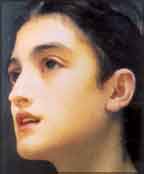The world of arts
The Winter's Tale, Shakespeare's homage to a season
Gwen HERAT
Florizel, the king’s son in Bohemia falls in love with Perdita who
has reared by a shepherdess. At a sheep-rearing festival, king Polixenes
reveals himself, accompanied by Camilio.
The king identifies himself and threatens Florizel to disinherit him
if he continues his love for Perdita and also that he will put Perdita
to death if they do not leave each other.
'Were I crown the most imperial monarch,
Thereof most worthy.
Were I the fairest youth that ever made eyes swere.
Had force and knowledge, more than ever man's.
I would not prize them without her love'........
Act. IV, Scene IV
His words are timeless; as timeless as the four seasons upon which he
pays homage. All his plays are dotted with the seasons as some reference
is made to each and every one, summer being his favourite. Essentially a
nature lover, his adoration for them is inscribed in his plays.
If William Wordsworth put them in his poems, William Shakespeare did
same in his plays, sonnets and poems. These two English writers were
born to praise nature and her seasons. The birds and bees, flowers and
leaves, shurbs and trees, they were the seasons' glories that
Shakespeare raved about. The tender Mamillius says 'A sad tale's best
for winter' and proceed to declare again his own winter's tale,
Mamillius 'There was a man,
Hermions 'Nay, come sit down; then on
Mamillius 'Dwelt by a churchyard.. I will tall it softly, Yound crickets
shall not hear It'...
Act. II, Scene I
|

Were I the fairest youth That ever made my eyes swere’ From
the Winter’s Tale |
Written in 1611 and cited in Sicilia and Bohemia, the play is about
two kings and what matters to them. Leontes is the king of Sicilia who
is wildly overtaken by suspicion and jealousy when he imagins that his
queen. Hermions is pregnant with the child of Polixenes, the king of
Bohemia who was his royal guest for nine months.
The Sicilian lord, Camillo warns King Polixenas immediately to depart
to Bohemia as Leontes was planning to poison him. Leontes commands his
wife to be imprioned and their eldest child, prince Mamillius taken away
from her.
Hermione gives birth to a daughter in prison. Paulina, wife of
Antigonus, brings the baby to Leontese with the hope that he will be
emotionally stirred but instead he commands Antigonus the abandon the
'bastard by Polixenes' in some distant desert place.
At Hermione's trial a message from the Delphie oracle, declares the
queen's innocence which Leontes refuse to accept.
Officer 'you here shall swear upon the sword of justice...
Leontes 'Break up the seal and read'
Officer (reads) 'Hermione is chaste; Polixenes blameless; Camillio a
true subject; Leontes a jealous tyrant, his innocent babe truly begotten
and the King shall live without an hair, if that which is lost be not
found'..... Hermione faints when she hears the death of her young son,
Mamilius and is carried out.
Paulina informs Leontes that his queen has died.He repents and vows
life-long mourning. In the meantime, Antigonus has left the baby on the
Bohemian shore with the name he gives her which is Perdita. He also
leaves a bundles of gold so that whoever finds baby Perdita will look
after with the gold. Antigonus vanishes from the scene, probably pursued
by a bear.
Sixteen years pass.
Florizel, the king's son in Bohemia falls in love with Perdita who
has reared by a shepherdess. At a sheep-rearing festival, king Polixenes
reveals himself, accompanied by Camilio.
|

‘If this be nothing’ From The Winter’s Tale. |
The king identifies himself and threatens Florizel to disinherit him
if he continues his love for Perdita and also that he will put Perdita
to death if they do not leave each other. Camilie advises them to go
over to Sicilia and meet up with Leontes.
He also tells the same to Polixenes in the hope that will end in
reconciliation.
In the meantime the shepherd and the Clown along with their proofs of
Perdita's discovery, leave for Sicilia where Leontes and Polixenes are
reconciled. Florizel and Perdita are also reconciled;
Paulina 'Start not; her action shall by holy as (Hermione steps down
from the pedestal)
You hear my spell is lawful.
Do not shun her.
Until you see her die again, for then
You kill her double. Nay, present your hand
When she was young you woo'd her; now in age
Is she become the suitor.
Leontese 'O, she is warm. If this be magic, let it be an art
Lawful as eating......
Act. V. Scene III
The Winter's Tale had several names attached to it. The play which
has been called a cycle of life, death, a resurrection, is among the
later romances of Shakespeare. The Bard scripted it from Robert Greene's
romance of Pandasto and spruced it up with his own enrichment. Many
dramatists gave it different twists and treatments, sometimes destroying
the fever of some characters.
The plot is in three movements. i.e. The King's fury, the flowered
idyll of the Bohemian pastoral lit by the speeches of Perdita and the
songs of Autolycus and finally the grave beauty of peace and
reconciliation.
The Winter's Tale was not staged for over a century before 1741, Two
versions of the play, one produced by Godman Field with Hanna Pritchard
as Paulina at Convent Garden. The other was Garrick's 1756 production
titled Florizels and Perdita. It was condensed into a 150-line prologue
with Garrick playing Leontes.
Over the centuries, thus, the play picked up on stage until its last
revised production in 1958 in Ontario.
The central figure in all productions was Paulina. Many great artists
played this role including the great Sarah Siddon. Not a favourite with
ballet except for few excerpts, The Winter's Tale was also filmed in
1966, directed by Frank Dunlop to the musical settings of John Ireland's
'When daffodils begin to peer' |

